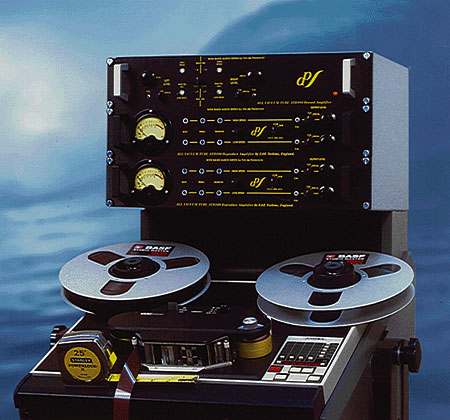Interesting interview with tube amplifier and electronics designer Tim de Paravicini. He breaks down the reasons why analog media provides a superior listening experience. Think digital radio is the sh*t? Think again. Link
When CD arrived in the 1980s, Tim de Paravicini was among the first to explain the shortcomings of the new format’s sound quality by pointing out that existing analog media were superior when analyzed in terms of sampling rate. He argued then that a digital medium would need a much higher sample rate than 44.1kHz (and a higher bit rate than 16) to match the resolution of analog tape or vinyl. I asked him to explain this again.
Well, the quick nutshell of it all is this. An analog microphone we all understand, and a valve or transistor amplifier is linear in its working range. On a vinyl record, when you are cutting an acetate, there is no modulation or chopping it up—you are down to the molecular level of the acetate to store that information. It’s a totally random but very minute-resolution storage system.
When it comes to digital, it’s how to operate it, how many bits we devote to it, and the sampling frequency, as to how we store that information. The original digital system of CD, with 16 bits and 44.1kHz sampling, was what the mathematicians deemed to be the minimum acceptable to human hearing for so-called hi-fi. They never looked at all the artifacts and all the problems. And they never did enough analysis of the human hearing mechanism to realize that we don’t stop hearing at 20kHz—people can discern and detect sound up to 45kHz. We have, as I say to people, an equivalent risetime of 11 microseconds in the hearing mechanism. And the ability to resolve detail in those digital systems wasn’t quite good enough.
In analog, you can change the thing and keep on aspiring to perfection without a compatibility issue. With digital, once you change any parameter, you’ve got a compatibility issue. Now, you can record on ProTools at 24-bit/192kHz, but it’s not compatible with CD. I did my own summation—and this is from 20 years ago—that if we did 384kHz at 24-bit, we’ll have a system that will resolve on a par with the best analog. That’s the holy grail. And the problem, for the computer people, is having the balls to go that whole hog.
At the moment, they are going the opposite way. Digital radio came along with a promise of perfect sound forever on the radio, and the BBC made all sorts of spurious claims using what I’d call not-true comparisons; for example, showing that they could drive a car around and digital would sound better under certain circumstances.
FM, when it was designed in the late 1940s, had a dynamic range of 80dB potentially, and FM has the linearity of an analog system, because the equivalent sampling frequency is around 108MHz, which is huge, and gives an extraordinary resolution. And then they come along with a digital system that is only 13 or 14 bits, and 32kHz sampling.
And now, with digital radio, even Radio 3 [the BBC’s classical-music and arts radio station] has been cut down to 160 kilobits per second. They’ve now abused us, putting on more and more channels of poorer quality on digital radio. What is the purpose? It’s not high quality! They don’t care any more about quality, that’s the saddest part. Whereas, with stereo and FM, the original aspiration was towards quality. With the BBC, back in the 1950s and 1960s, there was a relaxed quality in listening to Radio 3, for example, or Radio 4. But as time has gone on it’s been mutilated. And now Radio 3 is processed until it’s not very palatable.
People will eventually believe McDonald’s tastes good, if you force them. But there are people who like good food, and go out of their way to look for good food. The same with good music. And music is human emotion, it is every bit as important to us as food, because music conveys everything from laughter to crying to smiling to tears of joy.
We’ve got to get people to realize—hold your horses, before it all disappears. In the pop field now, young bands are realizing that if they put the vinyl out, they know that the kids can’t copy it. And the kids can now say to their peer group, ‘I’ve got the Rotten Tomatoes record (or whatever the name of the band is), you haven’t got it yet.’ There’s pride of ownership. But if you’ve got an iPod with 1000 tunes on it, you haven’t got anything tangible to show what you own. It’s a bit bucket, basically. And that’s why, I think, vinyl has survived and has been growing. Because you’ve got a package, the record and the sleeve, that has some meaning.
Tim thinks that people will be playing vinyl records for the next 30 years or so



